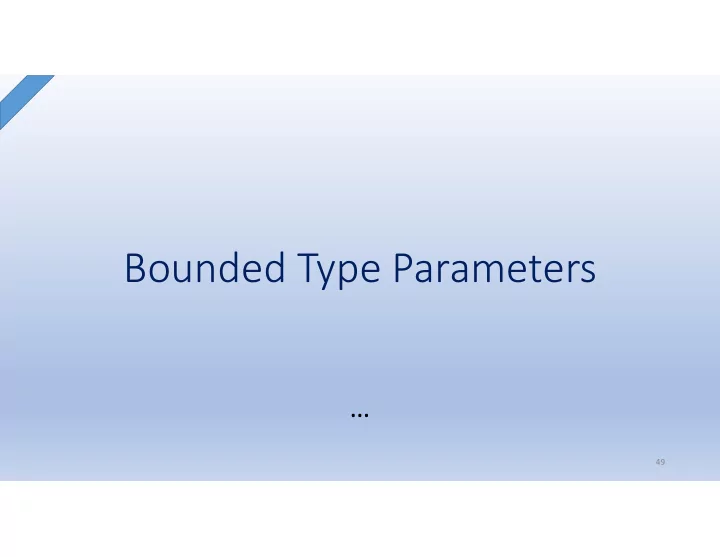

Bounded Type Parameters … 49
What is a bounded Type Parameter? • Restrict the types that may be used as type arguments for a parameterized type • E.g. a generic methods will work only with Integer-like types 50
Using bounded types with Generic Methods Please Note This means “subtype” not inheritance public class Box<T> { private T t; public void set(T t) {this.t = t;} public T get() {return t;} public <U extends Number> void inspect(U u){ System.out.println("T: " + t.getClass().getName()); System.out.println("U: " + u.getClass().getName()); } } 51
Let’s check that Java does its job public static void main(String[] args) { Box<Integer> integerBox = new Box<Integer>(); integerBox.set(new Integer(10)); � integerBox.inspect("some text"); // error: this actual parameter is a String! } Box.java:21: <U>inspect(U) in Box<java.lang.Integer> cannot be applied to (java.lang.String) integerBox.inspect("10"); ^ 1 error 52
Extra Free Feature! Bounded Types Parameters also allow to invoke methods defined in the bounds public class NaturalNumber<T extends Integer> { private T n; isEven(…) able to call public NaturalNumber(T n) { this.n = n; } intValue(…) Since n is of data type T public boolean isEven() { return n.intValue() % 2 == 0; } n is of data type T means… // ... • T happens to extend Integer } • thus T features intValue() method 53
New Requirement! What about introducing Multiple Bounds? Note: Definition This will be referred to as the leftmost bounded type <T extends B1 & B2 & B3> A type variable with multiple bounds is a If one of the bounds is a subtype of all the class, it must be specified types listed in the first bound 54
Example featuring a class For example: class A { /* ... */ } interface B { /* ... */ } interface C { /* ... */ } class D <T extends A & B & C> { /* ... */ } If bound A is not specified first, you get a compile-time error: class D <T extends B & A & C> { /* ... */ } 55
Debug this Example public static <T> int countGreaterThan(T[] anArray, T elem) { // Return the # of elements greater than elem ? What do you think is int count = 0; the problem here? for (T e : anArray) if (e > elem) // compiler error ++count; ! The > operator works only w/ return count; primitive data types… } … not objects 56
Debug this Example public static <T> int countGreaterThan(T[] anArray, T elem) { // Return the # of elements greater than elem ? How do we fix this int count = 0; problem? for (T e : anArray) if (e > elem) // compiler error ++count; ! T must extend the return count; Comparable <T> interface } 57
Now we may rewrite our original attempt, using this new Comparable<T> interface NOTE public interface Comparable<T> { We use “extends” public int compareTo(T o); not “implements” } public static <T extends Comparable<T>> int countGreaterThan(T[] anArray, T elem){ Remember… int count = 0; for (T e : anArray) This is about subtyping if (e.compareTo(elem) > 0) not inheritance or ++count; interface return count; implementations } 58
Recommend
More recommend